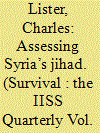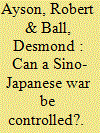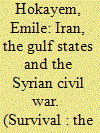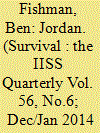|
|
|
Sort Order |
|
|
|
Items / Page
|
|
|
|
|
|
|
| Srl | Item |
| 1 |
ID:
138611


|
|
|
|
|
| Summary/Abstract |
The conflict in Syria has changed significantly since the first signs of an armed insurgency began to emerge in late May 2011. While the largely nationalistminded Free Syrian Army (FSA) gradually devolved into an amorphous gathering of locally focused militia units with minimal command links to a leadership in Turkey, the capabilities and influence of Salafist and Sunni
jihadist groups expanded considerably.
|
|
|
|
|
|
|
|
|
|
|
|
|
|
|
|
| 2 |
ID:
138613


|
|
|
|
|
| Summary/Abstract |
It has been decades since the last war between major powers in Asia, but there is no guarantee that the region will always be able to avoid conflict. The greatest strain on the peace is in North Asia, where there has been rising tension between China and Japan. What begins as a
minor skirmish between China and Japan could conceivably escalate into a more serious conflict that involved the United States and, in the worst case, the use of nuclear weapons by Beijing and Washington. Even a major conventional conflict (between just Japan and China, or
involving all three) could be devastating for North Asia and the wider region, leading to a significant loss of life and widespread political, institutional and economic damage.
|
|
|
|
|
|
|
|
|
|
|
|
|
|
|
|
| 3 |
ID:
138610


|
|
|
|
|
| Summary/Abstract |
An essential driver of the Syrian civil war has been the involvement of Iran, Saudi Arabia, Qatar and, to a lesser extent, the United Arab Emirates in every aspect of the struggle. Their role has influenced the calculations, positioning, behaviour and fortunes of the principal Syrian players. Irrespective of whether the effect was intended, this regional competition has revealed and deepened the many fault lines that cross Syrian politics and society. It has also exacerbated the polarisation of the Middle East.
|
|
|
|
|
|
|
|
|
|
|
|
|
|
|
|
| 4 |
ID:
138608


|
|
|
|
|
| Summary/Abstract |
Since the outbreak of civil war in Syria, Jordan has been contending with a flood of Syrian refugees, straining an already beleaguered economy. Moreover, the rapid spread of the Islamic State of Iraq and al-Sham (ISIS) across Iraq has substantially increased Jordan’s vulnerability to extremist infiltration and terrorist attacks. All this while, King Abdullah has continued to champion a reform programme – at least in name – to address Jordan’s most salient political and economic vulnerabilities following the Arab uprisings of 2011. So the last thing that Jordan needed this summer was a war between Hamas and Israel in Gaza.
|
|
|
|
|
|
|
|
|
|
|
|
|
|
|
|
| 5 |
ID:
138609


|
|
|
|
|
| Summary/Abstract |
In June, the Islamic State of Iraq and al-Sham (ISIS) made a dramatic entrance onto the global stage, aiming to establish its religious authority across the planet under a caliphate led by Abu Bakr al-Baghdadi. The group’s principal tool for expanding its influence has been brute force, but as it has attempted to build credibility and establish legitimacy, it has shown a deftness
for propaganda, using social media and cyber technology to recruit fighters and intimidate enemies.
|
|
|
|
|
|
|
|
|
|
|
|
|
|
|
|
| 6 |
ID:
138614


|
|
|
|
|
| Summary/Abstract |
At the tail end of an overland trip from Cairo to Cape Town in 2002, travel writer and novelist Paul Theroux – then more than 60 years old and writing his thirty-eighth book – had lunch with Professor Lee Berger, an archaeologist and paleoanthropologist at the University of the Witwatersrand, in a Johannesburg mall. Recalling their conversation in his book Dark Star Safari, Theroux recounts how the professor challenged him to make a threatening face. Theroux attempted his best grimace, but his failure to bare his teeth was, for Berger, a sign that humans were ‘undoubtedly a peaceful species’. According to him, the ‘paedo-morphic face’ (or child-like, rather than aggressive, features) that humans had developed showed that they
were largely defined by ‘peacefulness and cooperation’ rather than conflict. ‘Warfare is symbolic,’ he concluded.
|
|
|
|
|
|
|
|
|
|
|
|
|
|
|
|
| 7 |
ID:
138612


|
|
|
|
|
| Summary/Abstract |
In the first weeks of October this year, an array of tanks waited on Turkey’s southern border, their commanders watching carefully as the Islamic State of Iraq and al-Sham (ISIS) fought to capture the nearby Syrian–Kurdish town of Kobane. The Democratic Union Party (PYD), the force defending the town and an offshoot of Turkish insurgent group the Kurdistan Workers’
Party (PKK), sought help from the powers allied against ISIS: the European Union, NATO, the United Nations, Turkey and, above all, the United States. But Ankara was reluctant to directly intervene in Kobane; it refused to allow help to reach the defenders and denied Washington permission to fly offensive operations out of the US Air Force base at Incirlik, in southern Turkey. Despite the threat that ISIS posed to the country further down the line, Ankara’s preference appeared to be for the town to fall, thereby dealing a heavy blow to the Syrian Kurds.
|
|
|
|
|
|
|
|
|
|
|
|
|
|
|
|
| 8 |
ID:
138607


|
|
|
|
|
| Summary/Abstract |
In a piece published in the June–July issue of Survival, I considered ‘Ukraine and the Art of Crisis Management’.1 My aim was to explore the relevance of the strategic concepts of the Cold War to the unfolding drama of Ukraine, and in particular the challenge of securing essential interests without triggering a wider war. I judged the crisis to have been badly managed by Russia, not particularly well by the West, and with great difficulty by Ukraine. The consequences of the failure of crisis management lay not so much in expanding the area of conflict but instead in a sharp deterioration in relations between Russia and the West, and continuing and unsettling violence within Ukraine. The result was that, over subsequent months, the role of Russian forces within Ukraine became more direct and overt, as the more irregular separatist forces were unable to cope.
|
|
|
|
|
|
|
|
|
|
|
|
|
|
|
|
|
|
|
|
|